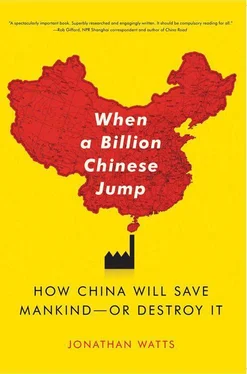Wandering Xanadu, I was almost alone. Modern China was in too much of a hurry to bother with ruins, especially Mongolian ones. I met only two other visitors. One of them, Lu Zhiqing, a sculptor, told me he had come in search of inspiration for a statue of Kublai Khan he had been commissioned to erect in front of Shangdu’s Summer Palace Hotel. He was disparaging of the Han attitude toward the past.
“We deliberately neglect chunks of history, especially the contributions made by minorities. Kublai Khan was the greatest of them. In his day this would have been a far more beautiful place. The Mongolians traveled, so they always found beautiful spots with tall grass and plenty of water for the horses.”
But Lu was optimistic that modern China was moving in the right direction. He said his income had doubled in the previous five years and the environment had improved: “I am an artist, so I see things in terms of colors. When I was a child, the sky was so polluted that it was often yellow, red, or black. It is better now, but we must do more. What we need in China is more green and more blue.”
“But you are a communist. Shouldn’t it be red?”
“Ah, that is history. That is from the West, from Marx and Lenin. It was good for the country …” He paused. The conversation had turned toward politics, a dangerous subject to discuss with foreigners. Instead, I asked what was the biggest change he had observed in his lifetime. The answer was predictable: “My life has become better. So has the entire country.”
We returned to Beijing, driving through another grit storm, skirting the dried-up salt bed that was all that was left of Anguli Lake, and overtaking flatbed trucks carrying turbines to the wind farms rising up across Inner Mongolia. We curled down steep winding roads through the hills, passed the Great Wall, a dam, a coal train, and a half-completed concrete theme park. Every few kilometers, I saw red-armbanded volunteers sitting at the side of the road. I was curious. We stopped to ask what they were doing. “Watching out for forest fires” was the reply. It was a sensible precaution. There had been no rain for several weeks. The hills were dry and brown. The sky was the color of cement. The artist’s ideal of more green and more blue did not look as though it would be realized anytime soon.
1949: Only socialism could save China
1979: Only capitalism could save China
1989: Only China could save socialism
2009: Only China could save capitalism
—Joke doing the rounds in Beijing after the global financial crash
It has been more than thirty years since I prayed for China. During that time, the country’s population has surged to over a billion and its economy has jumped far past that of the UK. The globe has not stopped turning, but the comfortable world order I knew as a child has indeed been shaken off its axis.
A new power is emerging in Beijing that represents both the apotheosis of human development and the folly of continuing with global business as usual. As I have shown in these pages, the planet’s problems were not made in China, but they are sliding past the point of no return here.
Mankind’s capacity to consume has reached a crescendo. There has never been more of us on the planet. Our species has never lived longer. Our footprint has never spread wider. 1The average human today burns more carbon, travels farther, and eats far more than any of our ancestors. A billion people in the rich nations of Europe, the United States, Japan, and South Korea have taken the world to the brink with their unsustainable consumption. Two billion more in emerging economies like India, Brazil, and Indonesia are pressing up from behind. In between is the Middle Kingdom, threatening to tip us all over the edge with a population that is now twice as big as that of the entire world in 1750.
It is a tough place to be at an extremely challenging time. Mankind is growing old. The generation born at the historical apex of human fertility in the late 1960s is now hitting middle age. The global population is growing at half the speed it once was. That is an opportunity and a risk. In the long term, the slowdown will be good news for the environment, but during the next twenty or thirty years it adds a demographic challenge to the ecological crisis. Once the current peak-generation era passes, there will be fewer working-age adults to support more elderly in rich nations and more children in poor countries. As a species, we are about to pass our prime.
Our planet too seems to be aging. On the road, I have seen how the earth’s lungs—the forests—have been decimated; its skin—the soil—is getting drier and more reliant on chemicals; the pressure on the earth’s arteries—the rivers—is higher than ever, owing to blocking dams and clogging pollution. Our energy reserves—coal and oil—are being run down faster than ever. Temperatures are less predictable, and there are more and more unhealthy growths in lakes and oceans. Many nations show some of these symptoms. But they are all apparent in China, where the impacts of development are accumulated, amplified, and accelerated.
Historians may well look back on China and Britain as bookends on the most spectacular and unsustainable passage of development that humanity has experienced. The model of carbon-fueled, capital-driven economic growth probably seemed a brilliant idea when it started in my country in the late eighteenth century. But that was one relatively small nation in a world that was, at the time, home to fewer than a billion people. Since then, the same model has expanded across the globe with barely any consideration for the finiteness of the earth’s resources. Like a game of pass-the-parcel, rich countries have “outsourced” the accumulated impact of unsustainable growth to faraway lands and future generations. China currently holds the unpleasant consequences. Not surprisingly, it does not want the music to stop. But it may not have a choice.
An alarming number of the country’s problems are spreading across borders to become a global security concern. Nationalism is rising as the environment declines. Dust storms in Japan, deforestation in Russia, and the increased extraction of oil from Canada’s tar sands can all be traced back to China. With the population expected to swell by almost 200 million by 2030, resources will come under increasing demographic pressure. Water shortages and pollution are already causing unease in Russia, Kazakhstan, and Southeast Asia. If rivers are diverted away from India, there is a very real risk of a conflict. Unless China kicks its coal habit, scientists say greenhouse emissions will surge, global temperatures will rise, and climate change will create millions more eco-migrants and food supply instability. It is no coincidence that the West suddenly seems more concerned with Beijing’s environmental performance than its governance or human rights record. 2
Fear is not the only reason for this attention. There is also hope that China is modernizing so quickly that it might find a sustainable route up the economic value chain. Compared with the 1970s, China and the developed world have far more in common. Our economies are more mutually dependent. Our tastes are converging. Many of us watch the same DVDs. We drink the same coffee. We eat the same junk food. This brings with it a temptation to assume that as in Europe, Japan, South Korea, and Taiwan, a rise in incomes will eventually bring an improvement in the environment. Under this optimistic scenario, the world’s biggest population is now clambering over the hump of the dirtiest, most wasteful phase of economic development. Once China manages to overcome that obstacle, our species can breathe easy. The heavy lifting will have been done. Other developing nations will be able to follow. After the global population peaks, probably around 2040 to 2050, the pressure on the environment should relent.
Читать дальше










